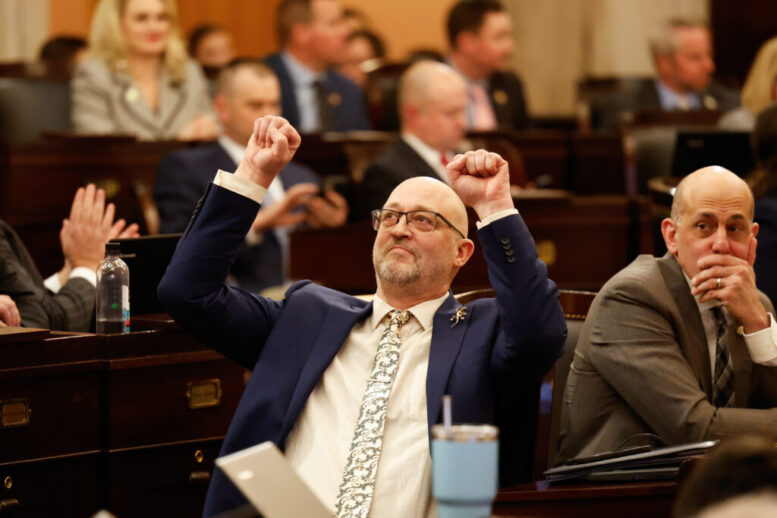BY MEGAN HENRY
The Ohio House of Representatives voted to override Gov. Mike DeWine’s veto of a bill that would prohibit gender-affirming care for trans youth, including hormone therapy and puberty blockers.
The vote to override House Bill 68 was 65 to 28 during Wednesday’s session, which brought lawmakers back from winter break early. The bill, sponsored by State Rep. Gary Click, R-Vickery, would also prevent transgender athletes from playing women’s sports.
(BG Independent editor’s note: State Rep. Haraz Ghanbari voted to override the veto. State Sen. Theresa Gavarone is a co-sponsor of the measure.)
“Today marks yet another victory for women and children in Ohio,” Click said in a statement. “It is hard to fathom that we live in a society that would tell children that they need drugs and scalpels to live their authentic lives.”
A three-fifths vote of the members of the House and Senate is necessary to override the governor’s veto.
HB 68 now heads to the Senate where it needs 20 videos to override DeWine’s veto. If both chambers pass the override measure, the bill would go into effect 90 days after the final vote. The next Senate session is Jan. 24 and the bill previously passed with 24 votes in the chamber.
“This bill is about protecting children,” Ohio House Speaker Jason Stephens, R-Kitts Hill, told reporters. “It’s also empowering families and empowering parents. … There’s good people on both sides who see the approach differently.”
He said he didn’t really have concerns that this bill could drive families out of Ohio, despite Ohio families saying repeatedly that this is exactly what the legislation will do.
House Minority Leader Allison Russo, D-Upper Arlington, expressed her disappointment in the House overriding HB 68.
“It is harmful to not only the trans community, but really all Ohioans because what it does is it sets the precedent and says that government and politicians once again, are going to be between individuals, between families, and their doctors and the best and most appropriate medical care,” she told reporters.
Her message to transgender families and individuals is to not give up hope.
“There are people who value them as individuals, and will keep fighting for their right and their freedom to get the care that they need,” Russo said.
DeWine released a statement following the veto override.
“I continue to believe it is in the best interests of children for these medical decisions to be made by the child’s parents and not by the government,” his statement read.
When he vetoed the bill, DeWine said the consequences of the bill would be severe.
“I believe this is about protecting human life,” DeWine said during a press conference on Dec. 29. “These are gut-wrenching decisions that should be made by parents and should be informed by teams of doctors who are advising them.”
Many lawmakers spoke before the vote to override DeWine’s veto. Republicans argued this bill is about protecting children and Democrats argued HB 68 would cause harm to transgender youth.
“This bill is not about protecting anyone,” said state Rep. Beth Liston, D-Dublin, who is also a doctor.
State Rep. Richard Brown, D-Canal Winchester, argued this bill deals with two different subjects — women’s sports and gender-affirming care — and violates the single-subject rule.
State Rep. Jean Schmidt, R-Loveland, focused on the sports portion of the bill.
“I see this bill as a dangerous path for children and women across Ohio,” she said. “We have the right to a level playing field.”
Gender-affirming care is supported by every major medical organization in the United States. Children’s hospitals across Ohio, the Ohio Children’s Hospital Association, and the Ohio Academy of Family Physicians all oppose HB 68. No Ohio children’s hospital performs gender-affirming surgery on patients under 18 currently.
What is gender-affirming care?
Gender-affirming care includes a range of social, psychological, behavioral and medical interventions “designed to support and affirm an individual’s gender identity” when it conflicts with the gender a person was assigned at birth, according to the World Health Organization.
Gender-affirming care generally consists of four general practices: social affirmation, puberty blockers, hormone therapy and gender-affirming surgeries, according to the U.S. Department of Health and Human Services’s Office of Population Affairs.
“Gender affirming care is also life saving care,” Teagan Vaughn, senior director of gender-affirming care for Equitas Health in Columbus, said to the OCJ.
Puberty blockers use hormones to pause puberty development and are reversible.
“It’s truly a pause button that has relatively no long term adverse effects on the body,” Vaughn said. “And they really give that young person an opportunity to make some real decisions about their body with a care team, their parents or guardians.”
Hormone therapy helps align a person’s body with their gender identity by giving testosterone hormones to those who were assigned female at birth and giving estrogen hormones to those who were assigned male at birth. This is partially reversible.
“The easiest way to view it is kind of like a second puberty,” Vaughn said.
A 2022 study published in JAMA Network Open showed that access to puberty blockers and gender-affirming hormone therapy improves mental health.
The survey found that access to hormones and puberty blockers for young people ages 13-20 was associated with a 60% lower odds of moderate to severe depression and a 73% lower odds of self-harm or suicidal thoughts compared to youths who didn’t get these medications.
Nearly 1 in 5 transgender young people attempted suicide in the past year, according to the Trevor Project 2023 national survey where they surveyed more than 28,000 LBGTQ young people ages 13 to 24.

